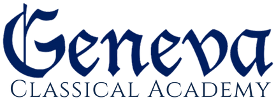“Sweet is the lore which Nature brings;
Our meddling intellect
Mis-shapes the beauteous forms of things:–
We murder to dissect.” William Wordsworth
Our modern educational system is based on a modern philosophy which assumes that everything in the world is a machine or works like a machine. Therefore, just as machines can be disassembled, everything in the world can and should be broken down and analyzed. The problem in doing this is we often destroy the very thing we want to study. This is true for frogs and true for subjects. We murder to dissect, as Wordsworth ironically observed in his poem “The Tables Turned.”
On the other hand, omnibus is a Latin word that means “all things linked together.” This is a perfect description for a classical education. At Geneva, we analyze, but more importantly, we excel at synthesizing. In science, math, history, literature, and Latin, we look at the makeup of organisms, words, languages, theories, philosophies, but we don’t stop there. The beauty of a thing is lost when it is cut to pieces. Geneva students synthesize by looking for the connections within disciplines and between them. The test of whether a student has learned grammar, for example, is whether or not he or she uses language well when speaking and writing.
Teaching our students to think critically is a springboard for searching for wisdom in order to lead a life glorifying to God.

